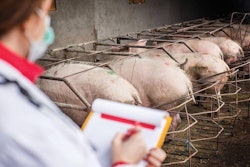
In Asia, new outbreaks of African swine fever have been recorded in domestic pigs in China, the Philippines and Russia’s Far East.
In China, the African swine fever (ASF) virus has been detected among a group of 24 pigs in Chongqing, according to the latest official notification to the report to World Organisation for Animal Health (OIE).
Source of the infection was illegal animal movements from other provinces, reports the agriculture ministry. Within the past week, the animals were found in a vehicle stopped at a highway checkpoint in the Jiangjin district of the city municipality. Several of the pigs showed signs of the disease, and all were slaughtered.
ASF was last detected in Chongqing in April, at a farm in the Yunyang region.
South Korea prepares to reopen pig farms
Authorities in South Korea are considering the reopening of pig farms that had been infected with the ASF virus last year, reports Yonhap. Owners of these premises have not been allowed to keep pigs since the outbreaks, which occurred in September and October 2019. Culling of approximately 400,000 domestic pigs appears to have successfully prevented the further spread of the disease in domestic pigs.
Owing to the risk of infection from wild boar, there are no plans to allow farms in the northern border region with North Korea to restock.
ASF outbreaks in the second half of 2019 continue to impact South Korea’s domestic pig population. According to another report from the same source, there were 11.09 million pigs in the country in the second quarter of this year — a reduction of 2% year-on-year.
In the northern provinces of Gyeonggi and Gangwon, a further 13 wild boar have tested positive for the ASF virus since July 20, according to recent official reports to the OIE.
Further outbreaks in Russia’s Far East
In recent weeks, ASF virus has been detected in a further three backyard herds in Primorsky krai. In groups of between two and 15 animals, a total of 31 pigs were affected in these outbreaks, according to the agriculture ministry’s latest report to the OIE.
According to the OIE, up to July 23, the total number of confirmed ASF outbreaks in the Far Eastern federal district of Russia stands at 103. A total of 4,062 have been lost to the disease through mortality or culling in these outbreaks. ASF is also present in the country’s western districts.
Another Philippines region goes into ASF lockdown
July 25 marked the first anniversary of the arrival of ASF in the Philippines. Over the past year, 359 outbreaks in 27 administrative divisions have been reported to the OIE.
This week, lockdown has been imposed on another district in Davao Del Norte, reports Philippine News Agency. Affected is a district of Panabo city, where 12 new cases of ASF have been confirmed.
Conditions of the lockdown include a ban on the movement of pigs or pork products into or out of the district. Furthermore, all pigs in the area will be culled. Owners of these animals will receive financial compensation from the government, as well as the offer of an interest-free loan, as well as some native chickens so that families can generate income after the loss of their pigs.
ASF situation worsens in Nigeria
In Nigeria, there are suspicions that ASF has spread to a seventh state, according to the latest official report to the OIE.
Morbidity and mortality of pigs have suddenly spiked in Delta state. The agriculture ministry is awaiting lab confirmation for the presence of the ASF virus.
In mid-July, a training pig farm at Owa-Alero in the southern state of Delta was put under quarantine measures for a period of three months, reported Premium Times. Combined with the culling of all pigs at the farm, this was the only way to stop the spread of the disease, said the state’s agriculture commissioner. He assured affected farmers that they would receive compensation from the government for their losses. Other pig farmers were urged to follow animal husbandry guidelines, particularly those regarding biosecurity.
Previously, the disease was confirmed in Lagos, Abia, and Ogun, where high mortality rates have been recorded since May, the ministry says. Some weeks ago, local media were already reporting losses of up to one million pigs in Nigeria from ASF.
New outbreaks in southern Africa
The number of confirmed ASF in South Africa has risen to 22, according to a new update to the OIE. Direct losses of pigs are approaching 3,900.
Recording two new outbreaks starting in June and July, the agriculture department says 159 pigs were involved in these outbreaks. At the affected farm in Mpumalanga and village herd in Gauteng, 118 of the animals died.
Since the first cases in the country in April 2019, all outbreaks have occurred outside the nation’s ASF Control Zone.
ASF is suspected as the cause of death of around 20 pigs in Zambia, reported Africa CGTN in mid-July. Around 250 animals were considered at risk of the disease in two districts in Muchinga. This province, which is in the north of the South-Central African state, borders Malawi and Tanzania.
ASF situation in other African states
Local media are reporting a new ASF outbreak in Togo. The disease was detected last week at a farm in Tsévié Dalavémondji, which is in the prefecture of Zio, according to Africa RDV. All the pigs at the affected premises will be slaughtered.
Zio is located in Maritime, the most southerly region of the West African state. In Aves district of the same region, the country’s first ASF outbreak was reported in May.
Other African states that have reported recent confirmed but unresolved ASF outbreaks are Cote d’Ivoire (Ivory Coast), Ghana, and Sierra Leone. This year, veterinary authorities in Kenya and Zimbabwe reported to the OIE that the disease situation in their respective countries had been “resolved.”
Along with coronavirus (COVID-19) and trade challenges, ASF continues to impact global pork markets, according to a new report.
Research is emerging that suggests feed additives — alone or in combination — may help to reduce the risk of transmitting ASF in feed.
View our continuing coverage of the global African swine fever situation.
















